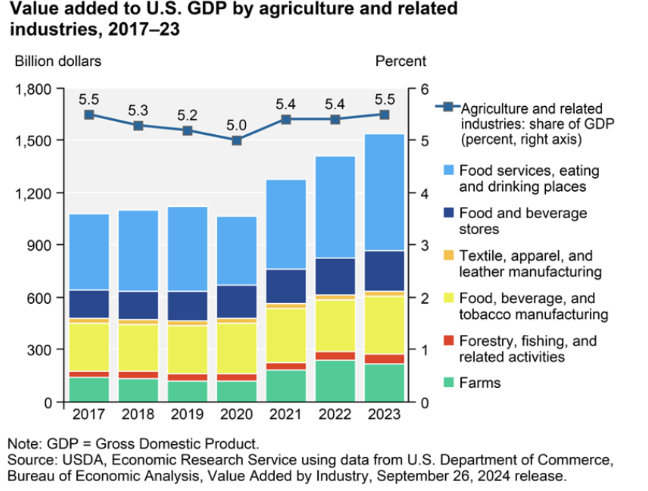November 27, 2025 | 13:37 GMT +7
November 27, 2025 | 13:37 GMT +7
Hotline: 0913.378.918
November 27, 2025 | 13:37 GMT +7
Hotline: 0913.378.918

The US agricultural industry contributes 5.5% to domestic gross domestic product. Source:USDA.
Solana-based real-world asset (RWA) platform Agridex has facilitated its first onchain coffee trade, a move it said could open the door to more cost-effective agricultural commodity transactions.
The transaction was executed by Tiki Tonga Coffee, a United Kingdom-based coffee brand, which exported premium coffee from its home country to South Africa. The payment was made in South African rands and settled in British pounds using the Agridex blockchain.
Tiki Tonga claims the transaction only carried a 0.5% transaction fee, which is a fraction of the 5%–7% fee on typical cross-border transactions involving agricultural commodities. The settlement was also instant versus the typical five-to-12-day turnaround times using traditional systems.
“Not only have we saved significantly on transaction fees, but the cognitive burden of managing documentation and compliance has been lifted,” said Tiki Tonga founder Brad Barritt.
In addition to coffee, the Agridex platform provides instant settlements on various agricultural commodities, including livestock, wine and olive oil. The company said it has $4.5 billion in pending transactions from agricultural partners.
As Cointelegraph recently reported, the Solana-based marketplace raised $9 million in funding, with major backers from Citadel, Goldman Sachs and Palantir.
Asset tokenization is considered one of the leading use cases of blockchain technology, and the agricultural industry could benefit the most.
The process of converting RWAs into digital tokens can potentially make assets more accessible to a wider audience while also reducing barriers to investments and helping companies transact in a more cost-effective way.
RWA tokenization “bridges agriculture and blockchain by tokenizing assets like crops, land and carbon credits,” Jon Trask, CEO of agriculture technology company Dimitra, told Cointelegraph.
Bringing agriculture onchain also addresses “key challenges such as inefficiencies, lack of technical assistance, environmental degradation and supply chain opacity,” said Trask.
Blockchain platforms can also be used by farmers to sell their products directly to buyers without expensive intermediaries, said Agridex co-founder and CEO Henry Duckworth.
According to the Bureau of Economic Analysis, agriculture contributes roughly 5.5% to US gross domestic product. Meanwhile, the total value of US farmland has eclipsed $3 trillion.
cointelegraph

(VAN) China’s cooking oil is suddenly flooding into India. It all comes down to a soybean surplus that Beijing doesn’t quite know what to do with.

(VAN) An Giang promotes supply-demand connections, standardizes quality and builds value chains, creating a foundation for sustainable bird’s nest development and aiming to expand exports.
/2025/11/24/5339-4-nongnghiep-075331.jpg)
(VAN) Recently, the conference on 'Sustainable Fisheries Linkage Chain - Tilapia for Export' took place in Tien Hai commune, Hung Yen province.
/2025/11/21/4309-2-153400_128.jpg)
(VAN) Green and low-emission rice is paving the way for Vietnamese rice to enter high-end markets, marking the beginning of a transformation journey toward greening and elevating the national rice brand.

(VAN) ‘Right to Win’ outlines a national action plan that shapes a new vision for Viet Nam’s agriculture in an era of renewal and global integration.

(VAN) Lam Dong’s farmed sturgeon output this year is expected to reach 2,300 tons, worth VND 450 billion, affirming the brand’s position on the market.

(VAN) A surge in Ukrainian egg exports, largely driven by soaring sales to the UK over the last few years, has notably pushed up egg prices on the domestic market.